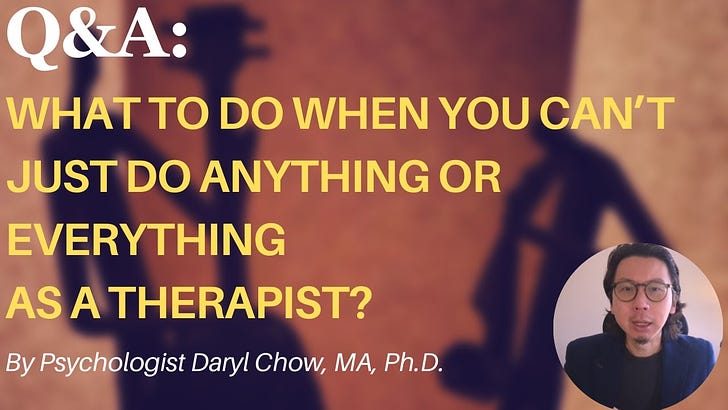Parenting (Part I). Frontiers Friday #155 ⭕️
Strategies for repair and connection, for half the money you think you should spend in the amateur sport of parenting.
Thanks for reading Frontiers of Psychotherapist Development (FPD) and our weekly newsletter, Frontiers Friday (FF). If you are new here, learn about me, the About Page and our “Grand Plan” overview post.
These posts are meant to be what Lewis Hyde describes as a “Gift.” What this “Gift” concept means for me is that
Nothing is expected out of you.
I hope you receive it.
I hope this animates and transforms you.
I hope you spread the love to others.
Parenting (Part I)
I first read this story in Bill O'Hanlon's book, Do One Thing Different.
A parenting expert who created a class with ten useful principles he taught parents on how to do better in their roles raising their children. He gave classes that were well attended and popular. He called these classes: Ten Commandments for Parents.
He didn't have any children himself, but after teaching the class for a few years, he met the woman of his dreams and they had a child together. After being a parent for one year, he decided to rename the class: Five Suggestions for Parents.
After another child and another year, he re-titled the class: Three Tentative Hints for Parents.
After he and his wife were blessed with twins, he stopped teaching all together.
To me, “Parenting is an amateur sport. The moment you think you've turned pro, the rules change.” (see Parenting Is…).
My wish is that you not only find this helpful for clients that you are working with, but also for yourself, as you juggle the fine art of parenting, sanity, and everything else on your plate.
p/s: Some of you might even find parallels with the relational aspects of parenting and therapy.
📕 Recommended Read: Peaceful Parents, Happy Kids.
I'm a HUGE fan of Laura Markham's work (as you will see in the recommendations in this series).
Don't let this unassuming title turn you off. There’s not only lots of practical strategies, but also many examples of ways to interact with your kids to foster connection.
As I’ve mentioned elsewhere, it’s one thing to understand, and quite another to help the other feel understood.
Key Grafs:
- When things are going badly, try a do-over. (The way we do the “do-over” with my kids is that we say, “let’s hit the reset button.”)
- Wondering how your child will learn if you don't raise your voice? When kids are scared, they go into fight-or-flight. The learning centers of the brain shut down. You child can’t learn when you yell…Besides, when you yell, you lose credibility with your child. Kids become less open to your influence.
- Never walk away emotionally. Your child depends on you to hold the vision of her at her best. If she senses you're giving up on her, she'll give up on herself. Has she strayed? Go get her. But don't join her on the low road. Embrace her with your love and she'll rejoin you on the high road.- Your child has been happily playing at childcare, but as soon as you show up, he has a meltdown. That's because he's been repressing his dependency needs so that he can function independently in a demanding environment. Your safe presence signals to him that he can relax and let down his guard.
- What you need to remember when times get hard: All misbehavior comes from basic needs that aren't met. Meet their needs for sleep, nutrition, chill-out time, cuddling, con-nection, fun, mastery, and safety. Let kids know in advance the behavior you expect. Give them "scaffolding”—teaching, little by little—so they can manage what's expected of them.
- Children want to be successful. (If they don't, that's a relationship problem, not a behavior problem.)
- …to a young child, any time your attention is focused elsewhere is a separation. That's why they act up as soon as we get on the phone or start cooking dinner...That's why all parents need to repeatedly reconnect with their children, just to repair the daily erosion created by life's normal separations and distractions. Effective parenting is almost impossible until the positive connection re-established.
- Wait before disciplining. Nothing says you have to issue edicts on the fly. They will never be what's best for your child's long-term development, or even what's best to prevent a repeat of the problem. Say as little as possible until you calm down, just something like: "I need to calm down before I can talk about this."If you take a ten-minute time-out and still don't feel calm enough to relate constructively, you can say, "I want to think about what happened, and we'll talk about it later."👨🏻💻Web-Read: Aha Parenting
This is Laura Markham's website. It is packed full of resources. I recommend her joining her mailing list.
It's funny how even though I've read her books, some of the stuff presented in her blogs still strikes me in a different way. Perhaps it is because of the timeliness of the content when I'm facing a garden variety of challenges with my two cheeky monkeys.📽 Watch: The Single Most Important Parenting Strategy
This is a must-watch for therapists / parents.
Becky Kennedy touches on a topic many of you would know alot about, that is, how to deal with alliance-rupture and repair.
The rupture-repair cycle happens both in the therapy room and the family household.
Key Grafs:
- All parents yell. No one knows what to do next.
- Whenever a parent asks me, "What one parenting strategy should I focus on?" I always say the same thing: "Get good at repair."
- Distinction between repair and apology: An apology often looks to shut a conversation down -- “Hey, I’m sorry I yelled. Can we move on now?” A good repair opens one up.Becky's book "Good Inside" is now on my to read list. If you have read this, please add in the comments to tell us what you've learned from it.
👨🏻💻Web-Read: Parenting: Who Is It Really For?
Readers of Frontiers of Psychotherapist Development (FPD) would know that I'm a big fan of Derek Siver's writings. Here's one of them.
I took my kids out for the day earlier this week. I made a conscious decision to lapse into their "time-blinded" way, not worrying about the clock, and roaming around their favourite places in Fremantle.
I thought I was doing this for them. Turns out, I need this.
I am the beneficiary of this disconnection from time and connection with them.⏸️ Words Worth Contemplating:
“For the best results with your children, spend only half the money you think you should, but double the time with them.”
~ Kevin Kelly
Notice Board:
Big thanks to those who chipped in to this chat. I’m mapping out stuff for the future based on what you’ve suggested as a dedication to you. Big thanks.
Big thanks to Beth Irias, LMFT for a soulful conversation on her podcast about Planned and Unplanned Endings in Therapy. Here’s a previous episode in her podcast Clearly Clinical (and if you wanna earn CE credit on this, click here). Stay tuned for news when this is released.
In case you missed last week’s Q&A podcast episode on a therapist who wants to get better, but is faced with too much choice, see below
Warm Welcome to New Folks on Frontiers of Psychotherapist Development (FPD)
Thanks to those who have introduced themselves so far. I really appreciate hearing from you. This is one of the ways for an introvert like me to socialise.
If you are new here, I just want to say a big hello to you and would love to hear from you. Tell me a bit about you and where you are from. Drop me an email info@darylchow.com
Click here to see more resources about Frontiers of Psychotherapist Development and Frontiers Friday.
Daryl Chow Ph.D. is the author of The First Kiss, co-author of Better Results, and The Write to Recovery, Creating Impact, and the new book The Field Guide to Better Results .





Parenting can be the most difficult yet most rewarding amateur sport(great metaphor). My children(I tend to refer), princesses and princes as they teach me valuable lessons, treat me like a royal and are destined to do great things. It's like wabi sabi; insomuch as Churchill taught "success is walking from failure to failure with no loss of enthusiasm".
Your mom much like mine provided hope and inspiration in learning life lessons in our youth. What wise words of wisdom do you find from your children?
I appreciated how you incorporated them in your podcasts. Thank you for all you are and all you do. Shalom. Shane S.